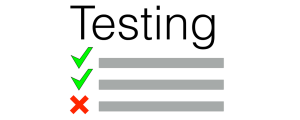I suspected my child’s reading disorder long before we had a name for it. When I finally admitted that we were dealing with “something” I suddenly had lots of questions and nowhere to turn. Who is in charge of learning disability labels? The schools? We are homeschoolers. How does that work? Who should I contact? How do I find a decent tutor?

It took several false starts and lots of research, but I finally got not only the answers that I was looking for, but more importantly, the resources my child needed.
In short this is what you need to know: call your primary care doctor and ask for a referral to a neuropsychologist or university. They can point you in the right direction. Now for the details:
Schools
First things first, no, the schools are not in charge of learning disability labels. They are a resource, but not the only one by far. School “reading specialists” can not give a diagnosis. They are not licensed to do so. Unless your school employs a doctor (and most do not) the best you will receive from the schools is a note on their records that indicates SLD Specific Learning Disability. This is just as vague as it sounds. It indicates that your child struggles with a specific task despite consistent instruction.
That said, the advantage of starting your quest for a diagnosis with the school is that it is free. Schools are required by law to test to see if students are eligible for special education services. Submit your request IN WRITING to the public school and they will get back in touch with you with details. Schools also often have teachers who tutor on the side and they may be available to take on your student. Note: Not all reading specialists receive the same training as OG dyslexia tutors. Do your homework before hiring. I’ll cover this topic in a future post.
School testing took us about 2 months to schedule, and a couple of trips to the school to complete. The results didn’t give me any definitive answers, but it did verify my suspicions and give me the confirmation I needed to schedule a more in-depth testing appointment.
Eye Doctors
Though a necessary step in any good dyslexia diagnosis is a thorough eye exam, eye doctors are not licensed to diagnose dyslexia. Vision tracking and perception problems are separate issues, and vision therapy does not remediate dyslexia.
This is where we lost a lot of time. I made the mistake of hoping that my daughter’s issue was “just” an issue with her eyes, and spent years working with a vision therapist (which was very expensive by the way). While it wasn’t entirely useless, I do sincerely wish that I had done a full dyslexia evaluation sooner. We could have started the right tutoring earlier, in addition to the therapy, rather than waiting for results that did not appear.
(side note: If your eye doctor is recommending therapy and they are the owners of the therapy center, run fast. Conflict-of-interest referrals are rampant in this field)
 Tutoring Centers
Tutoring Centers
Many companies claim to assess dyslexia, however, unless their testing is completed by a licensed doctor, they are not licensed to diagnose dyslexia. In addition, the assessor is paid by a company interested in bring in clients. This is an extreme conflict of interest and could lead to biased results.
Like schools and eye doctors, tutoring centers do not offer full dyslexia evaluation. What do offer is screening tests. These may give an indication of possible dyslexia, but their evaluation is not going to give you the full profile of strengths and weaknesses that a licensed evaluator will.
The advantage of tutoring centers is that they often offer free evaluation as an introduction to their tutoring services. This information can confirm your suspicions. As before, tutoring methods vary greatly. Make sure you are hiring someone trained specifically in methods scientifically proven to remediate dyslexia.
Primary Care Doctor
This is where we should have started. The best source for diagnosis varies from location to location. Your primary care doctor knows your area and the practitioners in it. They have seen their reports, and know who is thorough and who is not. They can give you specific referrals to the best professionals.
In some extremely rural areas, primary care doctors may offer to write a diagnosis based upon parent report and a few short evaluations. Unfortunately, while this may meet the standards for diagnosis, it does not offer you, as the parent, any in-depth knowledge of the specific areas of difficulty your child faces, nor any resources for addressing those issues. Request a referral to a specialist. Our pediatrician was more than happy to print us a list of names and phone numbers with her favorites circled.
Universities
We did not use this option, but it is an excellent resource. Many universities have special education departments that offer testing for learning disabilities. These programs are a bit tricky to dig up, but they are accurate and inexpensive. Ask your doctor specifically about university testing if this is something you are interested in. They can tell you which schools to check with.
Many universities also offer referrals to students willing to tutor. As I mentioned before, make sure you do your research into tutoring methods and training before hiring.
One thing to be aware of is that you may be working with students rather than professionals, however all students are overseen by a knowledgable professor.
Licensed Neuropsychologist
Licensed psychologists are the most experienced dyslexia evaluators. Specifically, you will want to see a Clinical Neuropsychologist. Dyslexic brains have been scientifically proven to be wired differently, and these doctors specialize in brain functioning. In the APA‘s fancy words,
“In addition to foundational and functional competencies in professional psychology, clinical neuropsychologists have specialized knowledge of functional neuroanatomy, principles of neuroscience, brain development, neurological disorders and etiologies, neurodiagnostic techniques, normal and abnormal brain functioning, and neuropsychological and behavioral manifestations of neurological disorders. Preparation in clinical neuropsychology begins at the doctoral level and specialized education and training is completed at the postdoctoral level.”
In other words, they know their stuff. They will not just simply diagnose dyslexia, but they will determine the precise nature of your child’s specific form of dyslexia (did you know that there are multiple versions?), and present you with a full profile of your child’s strengths and weaknesses to help inform future teaching strategies.
In addition to knowing about reading, neuropsychologists are skilled at spotting additional learning disabilities that may be present or determining that a child who presents as if they have dyslexia is actually struggling with an entirely different disability. Neuropsychologists are experienced in the field, and their many years of experience put them in an ideal position to offer knowledgable resources and guidance.
Getting an appointment can take a while. We had a 6 month wait for ours, and then after a month of testing, we had to wait another month to receive the therapist’s completed report. It can also be very expensive. Check with your insurance to see what your coverage may be. As daunting as the time and money may seem, I am so glad that we went through this process. I got more answers from the neuropsychologist than all the years working with previous options. Their recommendations were all spot-on, and I have found their office to be eternally helpful, offering boundless lists of tutors, therapists, and support groups in my area any time I call with a question.
It seems like a daunting process doesn’t it? It felt like it at the time for us. I wish I had known that it really requires only one step. Call your doctor and ask for a referral. That’s all you need to do to start getting the answers you’ve been looking for. If you’ve read this far, you obviously are concerned about your child. If you think they could benefit from help, why not get them that help sooner rather than later?



Pingback: What is OG Dyslexia Remediation? - Liberty Hill House